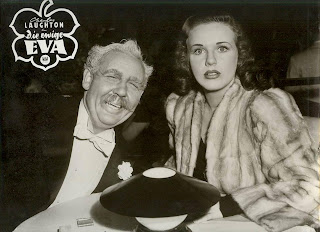 |
| Hitch does his cameo in Rear Window. |
Photojournalist "Jeff" Jefferies (James Stewart) is stuck in an apartment with a broken leg and a cast when he'd rather be out covering action in far-flung places with exotic names. Jeff has a beautiful girlfriend named Lisa (Grace Kelly), but he fears proposing to her because he doesn't think her patrician, elegant manner will go well with the places he has to travel to [although nowhere is it written that the wife must accompany her husband on such assignments]. Bored and needing distraction, Jeff begins observing his neighbors (on a marvelous, detailed set that shows many different kinds of apartments and tenants), such as the voluptuous dancer across the way, a pair of newlyweds who disappear behind the shade after moving in, a frustrated composer of romantic music, and a woman he calls "Miss Lonelyhearts" (Judith Evelyn) who talks to imaginary dates while she's having supper and gets drunk in bars. Eventually Jeff focuses on a man named Thorwald (Raymond Burr), whose nagging wife disappears one afternoon and never comes back. Jeff has reasons to believe Thorwald murdered the woman -- and eventually gets both Lisa and his nurse Stella (Thelma Ritter) on his side -- but his smug detective friend Doyle (Wendell Corey) assures him that he checked and the woman really is out of town. But is she? Jeff and the ladies begin an investigation of their own that leads them into some serious danger. Some viewers of this wonderful film don't like being put in Jeff's position all the time, peering through windows, and find the film claustrophobic, but I can't agree. The movie, while imperfect, is very cinematic and well-made. It does take a while for the basic mystery plot to begin unfolding, but the two main characters and their dilemma -- two very different people in love but uncertain of how it will work out -- are interesting enough to hold the attention, and Stewart and Kelly give fine performances, along with Ritter, Evelyn and others. [This is another film like The Tingler in which the talented Evelyn gets across a character without really saying a word.] The movie builds in suspense and has a creepy and exciting finale. One thing Rear Window is missing is a great score by, say, Bernard Herrmann, but you can't have everything. John Michael Hayes' screenplay is full of black humor, even relating to the dismemberment of the woman's corpse, which is a plus or a minus depending on how you look at it. Based on a story by Cornell Woolrich.
Verdict: Smooth, unusual suspenser from the master. ***1/2.

























